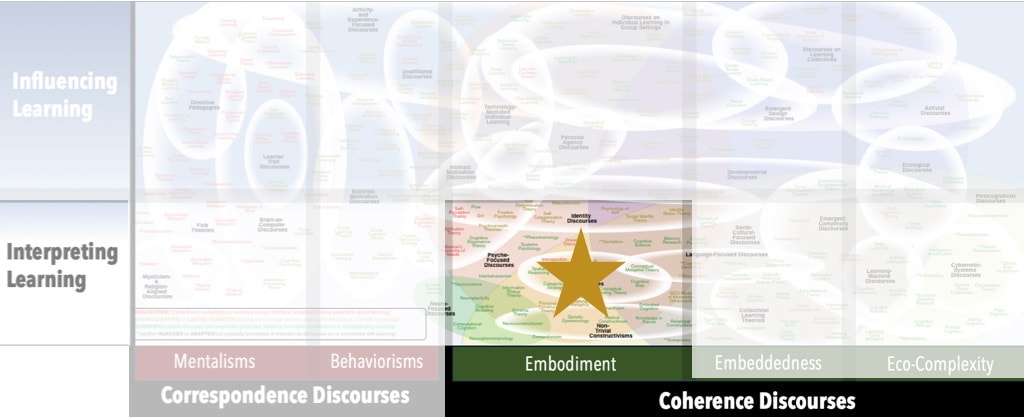Focus
Individual understanding/meaningPrincipal Metaphors
- Knowledge is … scope of possible actions and interpretations
- Knowing is … anticipating and predicting
- Learner is … an anticipator (individual)
- Learning is … construing (building and refining theories)
- Teaching is … facilitating self-awareness
Originated
1950sSynopsis
Personal Construct Theory is oriented by the assertion that anticipation and prediction are the main drivers of cognition. That is, one builds, tests, and constantly modifies theories to anticipate events and influence others. One’s subjective theories are seen to be assembled from “constructs,” each of which is a continuum with two extremes (e.g., large–small, happy–sad, clear–turgid). Agents are seen to interpret each experience – that is, to understand events and others – in terms of a relevant set of such constructs. In large part, such interpretations are not conscious. Associated constructs include:- Constructive Alternativism (George Kelly, 1950s) – the suggestion that humans are not limited to single interpretations of situations, but are able to construe and weigh the value of alternatives
- Repertory Grid (George Kelly, 1950s) – an interviewing technique that is intended to provide insight into personality, but that is not a personality test (i.e., of the sort associated with Personality Types Theories). The Repertory Grid focuses on how one gives meaning to aspects of experience.
Commentary
Personal Construct Theory has not attracted enough attention for a pattern of concerns to have emerged. It has been subjected to the same sorts of critiques as its parent disciplines, Constructivisms and Psychoanalytic Theories. In addition, close reading reveals tendencies toward Correspondence Discourses, including frequent mentions of notions associated with Folk Theories (esp. the Construction Metaphor and the Acquisition Metaphor) and a radical separation of inner/mental from outer/physical.Authors and/or Prominent Influences
George KellyStatus as a Theory of Learning
Personal Construct Theory is a theory of learning.Status as a Theory of Teaching
Personal Construct Theory is a not a theory of teaching, but it has been used as the basis for therapy. Concisely, the therapist’s role is to facilitate as the patient becomes more consciously aware of personal constructs so that they can be interrogated and, if appropriate, refined to improve capacities to anticipate and predict.Status as a Scientific Theory
There is some evidence to support Personal Construct Theory, but it does not appear that the theory is associated with a robust and systematic research program, nor that it has a substantial empirical base.Subdiscourses:
- Constructive Alternativism
- Repertory Grid
Map Location

Please cite this article as:
Davis, B., & Francis, K. (2022). “Personal Construct Theory” in Discourses on Learning in Education. https://learningdiscourses.com.
⇦ Back to Map
⇦ Back to List
